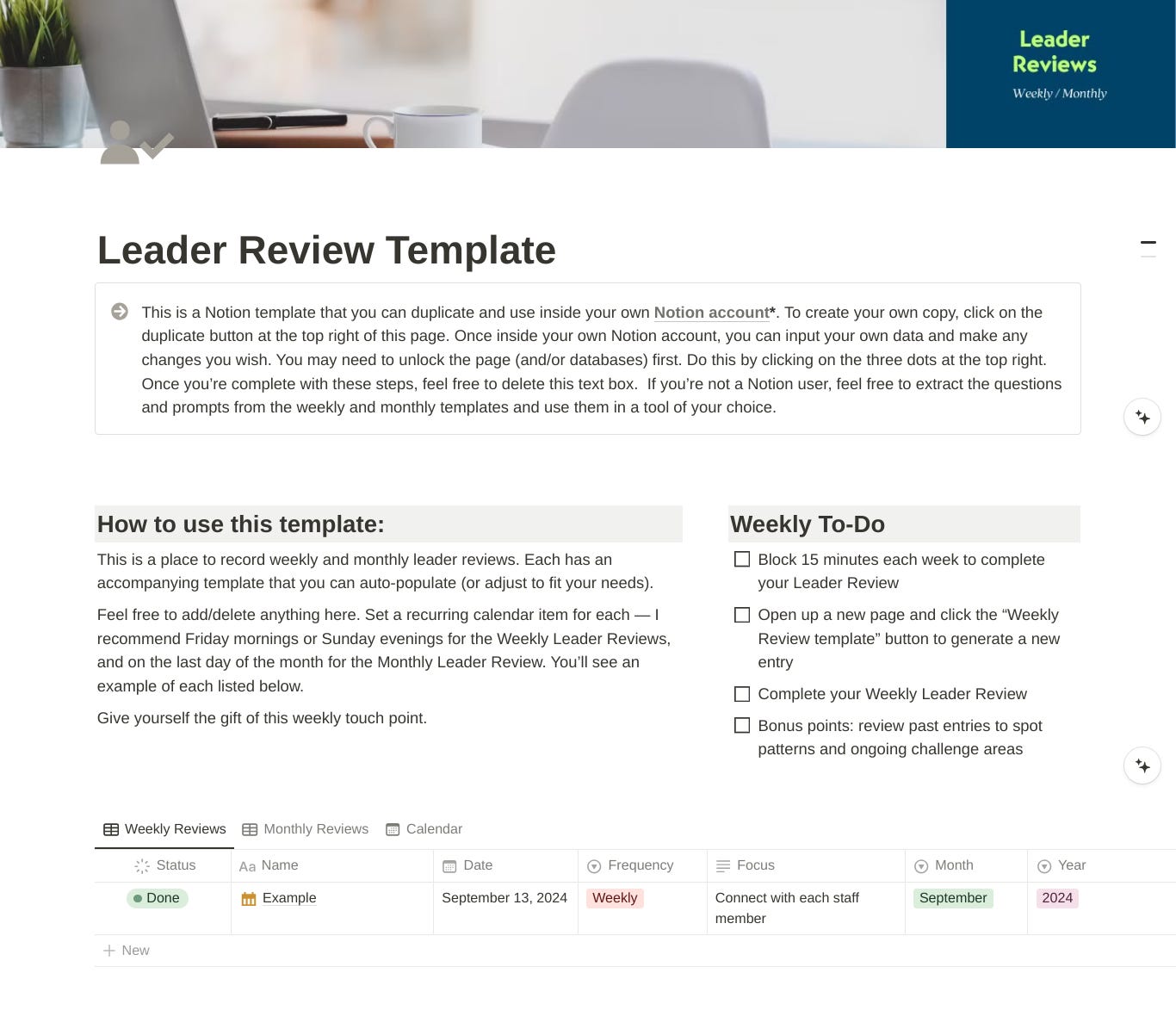Make Time for What Matters: A Calendar Strategy for Leaders
A simple strategy to ensure you're not always in fire-fighting mode. With a template to help.
Things which matter most must never be at the mercy of things which matter least.
– Johann Wolfgang von Goethe
Managing time is an ongoing challenge for most leaders
With demands coming from all directions — internal, external, above, below and sideways — it can feel next-to-impossible to carve out time to work on the less-urgent, more-important projects and initiatives.
I’m guessing you can relate: you likely spend a few minutes over most weekends or with a cup of hot coffee every Monday morning achieving clarity of focus — the projects you need to make time for, the tasks you need to cross off and the people you need to connect with.
And much of what you identify is likely time-bound — either by deadlines or external pressures from clients, bosses, and various stakeholders all with varying expectations of you.
This is how most of us work: what’s here, what’s now and what do I need to do to keep things from imploding. We operate from a place of “I’ll get to that after I deal with this,” that keeps us in a perpetual loop of ‘one day, some day’ management.
There’s no judgement from me here — it’s not like I’ve got this on lock.
But what I do know for sure is that this pattern of perpetual in-real-time-only work inevitably keeps us from getting to the priorities and projects that would advance our goals in a meaningful way.
It leaves us getting to the end of most weeks saying to ourselves, “Did I get anything of substance done?”
If you find yourself acknowledging that despite good intentions, your most important priorities aren’t getting the time they deserve, read on for a calendar strategy for busy leaders.
Meal planning for your life
Let’s put this in the context of meal planning — something we all know we should do, and yet many of us don’t make time for. Here’s how that usually rolls out week-to-week.
Again, I cast no judgement. During soccer season I consider it a win when we all sit down for grilled cheese.
🥑 Meal Plan Scenario #1:
Every Sunday, you head to the grocery store with a loose list of items you need to feed you (and your family) for the week: toilet paper, carrots, milk, coffee cream, bread, meat, cheese, snacks, onions, garlic, yogurt etc.
You get back home, put your bags on the counter, having dropped way more money than you’d like, and unload the items into your pantry, fridge and freezer. And then you go about your day.
Monday comes and you’ve got enough fresh stuff to pull together a meal on the fly. You make a caesar salad, grill some chicken and stuff the ingredients into a wrap before you head out to an evening activity.
Tuesday comes and your work day goes late. You walk in the house closer to 6pm, starving, with hungry kids asking, “What’s for dinner?” The truth is? You have no idea. So you open the fridge and stare longingly, hoping some magical meal will pop out, ready to go. You see the food you bought on Sunday, but it all seems uninspiring and like way too much work to do anything with. You pop a frozen pizza in the oven and promise yourself tomorrow will be better.
Wednesday comes and once again, you find yourself staring into the pantry and fridge, looking for meal inspiration. Only this time, you have that niggling sense that the drawers full of produce you bought on Sunday when you were filled with optimism and energy — are now starting to sag and wilt with the neglect. So you rally yourself and cut up a bunch of vegetables and make your family a quick stir-fry. You take it as a win.
Thursday — more of the same. Friday — you order in or eat out. Saturday — more of the same, coupled with a frustrating fridge clean out that fills the compost bin. Sunday — you’re back to the grocery store with a renewed commitment to do better.
Lather, rinse, repeat.
🥑 Meal Plan Scenario #2:
Every Saturday afternoon, you carve out 60 minutes with a coffee in hand, plus a notebook, schedule and a few cookbooks (or online recipes) to map out a week’s worth of meals. You ask your family for ideas, which proves fruitless as they only ask for treats, so you instead turn to the fridge, freezer and pantry to figure out what you already have and could build a few meals around.
By the end, you have at least five days planned out, leaving two open should anything come up unexpectedly (which we both know it will). The next day, you head to the grocery store with a very specific list in mind and get only what you need instead of a bunch of random items you hope to be motivated enough to cook.
On a good Sunday, you carve out a little extra time to meal prep a few items — cutting up veggies, grating cheese, making muffins — anything that helps the week go more smoothly. You don’t always get to this step, but you know how good it feels when you do.
Monday goes according to the meal plan schedule. So does Tuesday. Wednesday throws you a curve ball with an after-work meeting you didn’t see coming. You grab a salad and sandwich on the go or drive through for the family, and you remind yourself to readjust your meal plan schedule for tomorrow. When you get home, you throw Friday’s originally planned ingredients into the freezer so they don’t go bad and bump the rest out by a day.
It’s not perfect, but you’ve got food on the table most nights without the daily mental load of figuring out what to make.
Lather, rinse, repeat.
Now translate these meal planning scenarios to your time at work, as a leader (at any level).
In scenario #1, you’re taking it day-by-day, fighting fires and dealing largely in the present moment. What guides your actions is dictated by pressing requests, people hanging by your door asking for help, urgent deadlines and unexpected curve balls.
You are busy, you’re action-oriented and you’re productive — you get a LOT done in a day. But deep down you know that you’re not getting to the stuff that matters most — the tasks, priorities and projects that would generate more influence and impact — either for you personally, for your team or for the stakeholders and groups you serve.
In scenario #2, you’re still taking it day-by-day, you’re still fighting fires, and you’re still dealing with all the unexpected asks that are an inevitable part of being a leader. We’re not operating under any illusion that in scenario #2 you’re able to work in some kind of quiet, focused utopia each day. I mean, come on! But what’s different here is that you have carved out protected time — away from the day-to-day demands — to work on some strategic initiatives or to simply quiet your mind and think about what’s next.
You blocked the time in your calendar on Sunday, and promised yourself that unless a true emergency emerged, you wouldn’t sacrifice this time for anything. It’s only 45 minutes — you’d much prefer 90 — but you know that 45 is better than nothing, and you can use that time to work on something other than what’s at the top of your inbox.
Channel your future self when you plan your calendar
The mistake most of us make is assuming that if we declare something a priority, then the time gods will come down from on high and afford us the Goldilocks window of time each week to make it happen.
We both know how that usually goes. 😉
As unsexy and basic as it might sound, the only path forward requires some intentional, purposeful planning and 15 minutes each week with your calendar of choice — just like you would when plotting out the upcoming week’s meals.
Your future self will thank you.
Here’s a step-by-step approach I find works well:
✅ Open your calendar of choice
✅ Schedule in any known time off (holidays, life events, appointments etc).
✅ Give yourself a buffer day (or hour) on either side of these items (depending on scope) so you can get ready / regroup without a full calendar of meetings
✅ Book in your Leader Time1 (strategic, focused time) which could include:
- Weekly Leader Reviews every Friday (see below for a template)
- Monday morning planning and prep time
- Concentrated non-negotiable project/priority blocks for your most important work
- Personal / Professional development time (courses, communities, retreats, promotional efforts etc)
- Monthly Leader Reviews (e.g. last Friday of each month)
- Quarterly planning sessions (solo and/or with your team)
✅ Non-meeting time (block out windows where you’ll keep your calendar meeting-free -- I promise you can do this!)2
✅ Other time off (e.g every Friday afternoons for self-care / personal pursuits)
We both know that your calendar will change and you’ll have 86 million things you didn’t expect come up over the course of the year.
That’s life. And…
Getting intentional about establishing windows of time now, before your calendar is accounted for by everyone else, is the best way I know to give you a fighting chance at making time for what matters most.
Yes, you’ll still have to hold the boundary and decline other people’s requests to bump out your time blocks, but trust me when I say that it’s easier to honour time you’ve already allocated for yourself than it is to find time once the week’s already in full swing.
September offers you a fresh start and a chance to give yourself the gift of time well spent.
I can promise you that if you don’t, nobody else will.
Steph
p.s. this week, paid subscribers will enjoy a Weekly & Monthly Leader Review template (built in Notion) to put some of these principles into action. Scroll below to access and to save 25% on an annual subscription — only until Sept 17th.
Work with Me
If you'd like support staying connected to what matters most, I’d love to help.
I’ve got space in my calendar for two new clients starting in October. If you’d like to explore working together, I’d love to chat. There are two main ways to work with me:
Leadership Coaching — 3, 6 or 9 month engagements
On Demand Voxer Coaching — monthly as needed
Want to chat? Book a quick chat with me or hit reply and we’ll figure out if coaching is right for you.
Weekly & Month Leader Review template
My favourite practice to support today’s message is to conduct a short, quick Weekly & Monthly Leader Review. This ensures you’re staying focused on what matters most, and being deliberate about carving out time for what’s most important.
Want to kick start your review process? I made it easy for you by creating a simple, easy-to-use template inside my favourite tool, Notion.
To access, simply upgrade to become a paid subscriber (and until Sept 17th, save 25% on an annual subscription!).
Keep reading with a 7-day free trial
Subscribe to Leaders in Progress to keep reading this post and get 7 days of free access to the full post archives.














